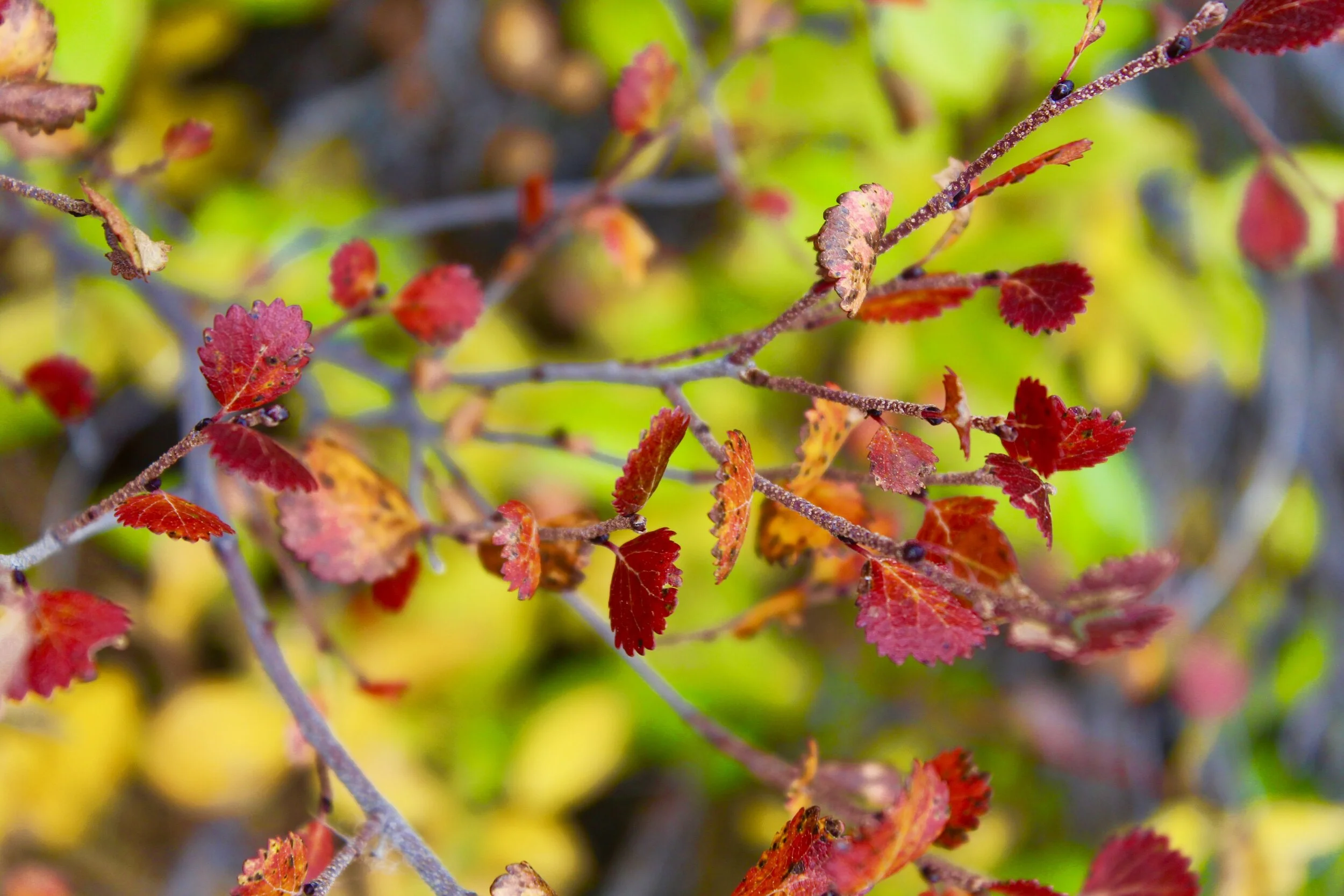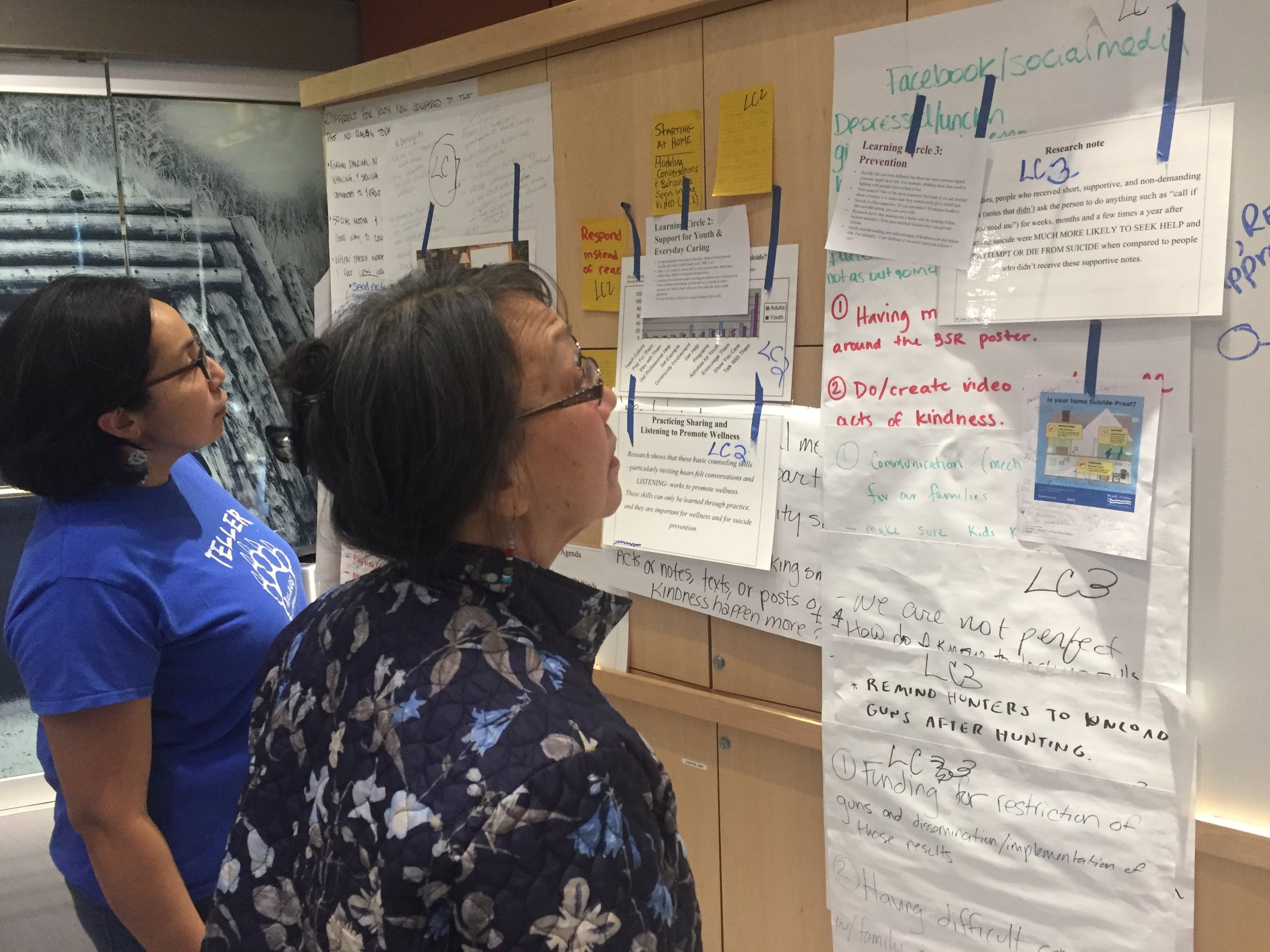The PC CARES Model is more than training: It relies on community connections and community ownership
The PC CARES program is designed and enacted in partnership with Alaska Native communities to shift suicide prevention efforts from top-down, clinically-managed crisis intervention to community-based primary and secondary prevention efforts, carried out by those who regularly interact with vulnerable young people.
The model contains the following elements:
-
In-person - Community-based learning circles are facilitated by local facilitators. PC CARES fulfills a dual need by training future community health, wellness and social workers to deliver an innovative suicide prevention program, and by offering engaging, research-based and locally-led suicide prevention training more to more communities across the state.
In both virtual and community-based learning circles, discussion-based presentations are supplemented by video, handouts with local data, and activity pages. An active learning model helps to motivate participants to reach out to youth and mobilize various forms of social support to ensure safety and initiate preventive care. Facilitators’ and participants’ own stories will reinforce concepts, and the training activities, small group discussions and role plays to practice intervention skills will extend learning and motivation to use it.
Each 2-3 hour PC CARES “learning circle” utilizes a flexible, blended education and mobilization approach in order to train providers to assist, support, and coordinate in the prevention of youth suicide. Sessions are intended for adult community members who are in key positions to identify and engage with vulnerable youth (i.e., social workers, village-based counselors, health aides, and other health services workers, teachers, school staff).
Virtual - The Virtual PC CARES learning circles are facilitated by members of the PC CARES research and implementation team, comprised of researchers and Indigenous wellness advocates who co-authored the program and experienced facilitators in Alaska.
Learning circles are designed to share locally-relevant research to spark discussions as participants work together to prevent youth suicide. PC CARES offers tools, skills and ideas that can be useful before, during, and after a suicide crisis. Universal prevention steps—which could help prevent suicide crises by fostering community strengths—are emphasized as essential avenues for change.
This course involves 4 virtual 2-hour sessions. Each session builds on the next, and it is highly recommended that participants attend all four. Sessions are interactive and participatory, involving multimedia presentations, small group discussions, surveys and polls.
Virtual learning circle topics:
-
At this 5-day training of trainers, participants learn about the philosophy of PC CARES, the research that makes up the ‘What does the research show?’ portion of each LC session, Facilitator Guide, tools and material resources provided by the model (PC CARES Toolkit), facilitation skills, and practice facilitating PC CARES learning circles with their partner. Participants in the ToF will also consider the key people and sectors within their community to recruit to participate in the learning circles. They will troubleshoot and discuss recruitment strategies for their community, and get support for taking on a leadership role in their community around the complex topic of suicide. At the end of this training, participants will be prepared to host PC CARES learning circles in their local community. This 40-hour training was is approved for continuing education hours through the National Association of Social Workers-Alaska Chapter.
-
This is a 2-6 hour training that expands L3: Prevention and tailors it for a specific audience, such as school counselors, school nurses, and social workers. Participants will be trained to have 1:1 conversations with a concerned parent, to share the information with their colleagues to have similar conversations, and to embed these practices into organizational protocols.
The single most effective way to prevent suicide is firearm lethal means reduction in settings with guns. Most families in Alaska have firearms, and school staff need to be ready to engage in conversations with family members to keep young people safe, especially when students are struggling with mental health. The hands-on session will offer information and resources to participants and give them time to practice how to engage with parents and guardians about lethal means safety to prevent suicide. Discussions will invite participants to consider how they might institutionalize lethal means reduction protocols in their schools and districts.
The workshops invite participants to consider how to balance an evidence-based intervention to reduce suicide risk – lethal means reduction – with school communication norms related to parents and guardians, and to consider how to respectfully engage with adult family members and community leaders to promote safety when concerned about a student’s mental health struggles, connection with someone who died by suicide, or some other indication of a student’s elevated suicide risk.
training outcomes
Learn more here about what happens when local helpers, school staff, and others create a community of practice around preventing suicide and promoting youth wellness.





